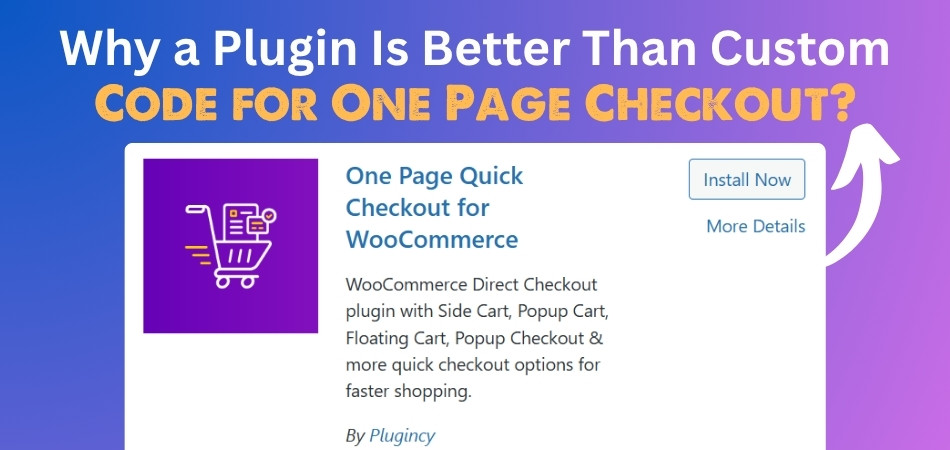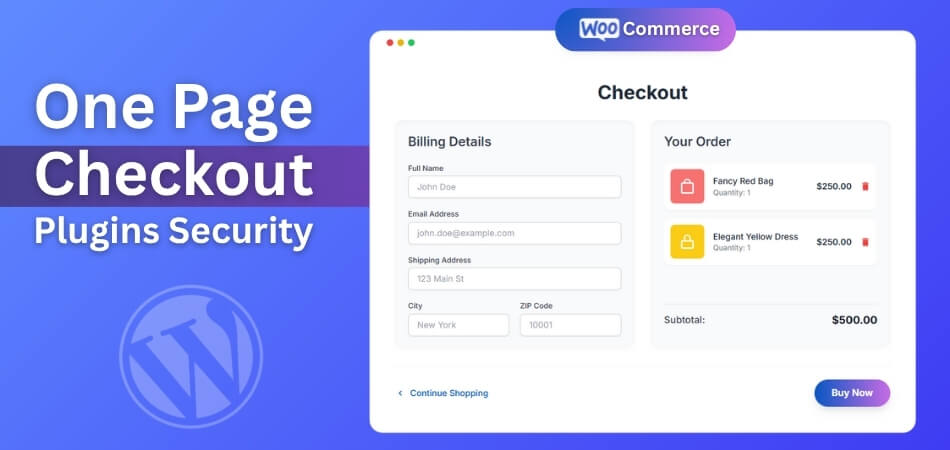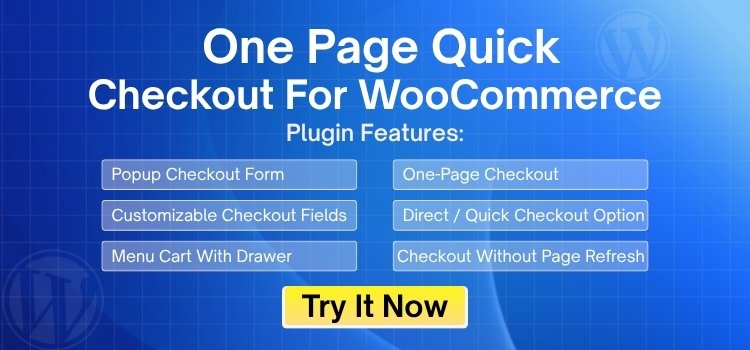One page checkout makes online shopping faster by putting everything on one screen. It removes extra steps and helps customers finish their orders quickly. Store owners love it because it reduces drop-offs during checkout. But many still wonder why a plugin is better than custom code for one page checkout?
A plugin is better than custom code for one page checkout because it’s easier to set up, saves time, avoids coding errors, and updates automatically. Plugins offer support, work with most themes, and let you customize without editing code.
If you’re trying to improve your online store’s checkout, you may be thinking about the best way to do it. This article explains everything you need to know to choose between plugins and custom code. You’ll learn the pros, cons, and what to look for in a good one page checkout plugin.
Why a Plugin Is Better Than Custom Code for One Page Checkout?
Plugins are like shortcuts that make your online store work better. One page checkout helps people buy faster without many steps. It’s important to choose the right way to set it up. Keep reading to see why plugins are better than writing custom code.

Easy to Set Up
You don’t need to understand coding or hire someone to help out. A plugin works right away after you install and turn it on. With only a few settings to adjust, your checkout page becomes active. You won’t waste time learning complex stuff or fixing mistakes. Some tools, like the WooCommerce One Page Checkout plugin, also fit right in. These tools make your website easier without doing anything extra. It’s quick, simple, and ready to use.
Saves a Lot of Time
Most custom coding takes hours to create and fully test properly. A plugin skips that because it’s already built by professionals who know code. Instead of writing long scripts, you just press a few buttons. That means more time to work on other important parts of your site. It helps you launch your store quicker without stress. You don’t have to solve confusing coding issues by yourself anymore.
Less Chance of Mistakes
Custom code can break if even one letter is typed wrong. Plugins are tested many times to make sure they run smoothly. If something goes wrong in a custom code, it’s hard to fix. But plugins are stable and safer to use without much worry. They don’t crash easily like homemade coding sometimes does. This makes everything work better during checkout and helps people buy faster.
Regular Updates
Developers who make plugins keep improving them with fresh updates regularly. These updates help fix bugs, improve speed, and add new helpful features. If you use your own code, you must fix everything yourself always. That takes time and knowledge you may not have right now. Plugins update automatically or with one click, saving you time. You won’t have to learn coding just to keep your site working well.
Better Compatibility
When different parts of your website don’t work together, problems begin fast. Custom code might not match with your theme or other plugins installed. But plugins are usually built to work with most themes and tools. That keeps your checkout smooth and avoids errors from happening. It also helps your site run faster and better every time. Everything just connects nicely when using a trusted plugin instead of custom code.
Helpful Support Available
If you get stuck with a plugin, help is usually easy to find. Many plugins come with support teams or guides made for beginners as well. They answer your questions quickly without needing tech skills from you. If you use custom code, you’ll be fixing everything alone, which is tough. With a plugin, someone is there to help when something goes wrong. That support makes everything less stressful and easier to manage.
Tried and Tested
Lots of people use plugins, so bugs and problems get fixed quickly. These tools are tested in real stores and improved by feedback from users. Custom code is only tested by you, so mistakes can be missed easily. A plugin saves you from all that trouble and extra checking work. You can trust that it will run well from the start. It’s safer than depending on your own coding skills alone.
Simple Customization
Just a few clicks in the plugin settings let you make changes easily. You can pick how the page looks without writing even one line of code. Custom code requires you to edit files every time you want changes. That takes time and sometimes breaks other parts by mistake. Plugins make it faster to update designs and settings on your page. You get more control without needing to learn any hard stuff.
Less Maintenance
Keeping things simple helps your website run better every single day. With custom code, you’ll need to check often for errors and updates. That becomes a lot of work and takes up your free time quickly. A plugin mostly runs on its own and doesn’t need much care. It’s made to last through updates and changes without breaking. This makes running your online store easier and less stressful for you.
Plugins are the better choice when setting up one page checkout. They save your time and make everything simple to manage and run. You won’t need to worry about mistakes or broken pages again. Just install the plugin and focus on growing your store easily.
Top Features to Look for in a One Page Checkout Plugin
A checkout page can make or break the buying experience at any store. If it’s slow or hard to use, people may leave without buying anything. That’s why smart features in a plugin really matter. Let’s check what you should look for.
AJAX Functionality
Most shoppers don’t like to wait for a page to reload after every small action. That’s where AJAX helps by updating parts of the page instantly without refreshing. When someone changes a shipping method or updates their cart, it happens quickly in real-time. This keeps the checkout smooth and avoids loading delays. If you’re unsure whether to make the switch, start by watching for signs your WooCommerce checkout needs fixing—these red flags often point to missing features that a quality one page checkout plugin can resolve.
Mobile-Friendly Design
Many people shop from their phones, so the checkout page must work perfectly on all screen sizes. A good plugin will automatically adjust the layout to fit phones and tablets. Buttons should be easy to tap, and text should be easy to read. Nobody wants to zoom in or swipe around just to finish a simple order. This makes the checkout feel fast and easy for everyone, no matter the device.
Payment Gateway Support
Different buyers use different payment methods, like cards, wallets, or even cash on delivery. A powerful one page checkout plugin should support all the major gateways. It’s helpful if the plugin connects easily with services like PayPal, Stripe, or local options. This means people won’t need to leave the page or face errors. The easier it is to pay, the more likely people will complete their order without dropping off.
Fast Performance
A slow checkout page can make people leave before finishing their order. That’s why speed matters a lot during checkout. A solid plugin will be lightweight and load everything quickly, even on slow internet. It also reduces extra steps so buyers can place their order faster. This saves time and keeps visitors happy. When everything loads fast, it builds trust and improves your store’s chances of getting more sales.
Easy Customization
Sometimes you may want to change the look or steps on your checkout page. A good plugin should let you do this without touching any code. It should give simple settings to change button colors, field labels, or even remove extra sections. This helps you match the checkout style with your store theme. When it’s easy to change things, you stay in control without hiring a developer every time something needs adjusting.
Choosing the right one page checkout plugin can make shopping feel better. Look for features that save time and remove extra steps. A clean, fast, and flexible checkout always brings more happy customers. Keep things simple, and your store will work great.
When Custom Code Might Still Make Sense for One Page Checkout?
One page checkout plugins aren’t the perfect fit for every store sometimes. Some shops need more control or features that plugins just don’t offer. That’s where custom code might be considered. Let’s explore when that could actually make sense.
- If your store has a very unusual checkout process that plugins can’t handle, then custom coding allows you to shape it exactly the way you want.
- Some big stores deal with special rules for taxes, shipping, or product types, so they use custom code to manage everything correctly and smoothly.
- A business might need its checkout page to connect with a tool or system that regular plugins don’t support, and custom code helps make that happen.
- Stores that offer subscriptions or bundles in special ways may need custom logic, which can be hard to do with most one page checkout plugins.
- Companies working with strict design rules or branding might want full control of layout, and writing custom code gives them every pixel their way.
- Some businesses handle thousands of orders daily and need a system built for speed and handling pressure, which a plugin might not be ready for.
- If the store needs user roles with special pricing, limits, or steps, custom code allows building those exact rules into the checkout page easily.
Custom code isn’t always the first choice, but sometimes it’s the right one. When stores need special features, they can offer the control that plugins don’t. It does take more time, money, and effort to manage properly. So, it’s smart to use it only when really necessary.
Are One Page Checkout Plugins Secure Enough Compared to Custom Code?
Checkout pages play a big role when it comes to shopping online. Some people use ready-made plugins, while others go for custom-built options. But how safe are these plugins compared to the ones made from scratch? Let’s break it down.

Plugin Popularity
One page checkout plugins are super popular because they’re quick to install and easy to use. They help speed up the buying process, which customers love. But just because many people use them doesn’t always mean they’re 100% safe. It really depends on how well the plugin is made and whether it’s kept up to date.
Code Control
With custom code, the developer has full control. That means every piece of code is written for a specific need. This makes it easier to spot and fix problems. Plugins, on the other hand, are made to work for lots of websites, which can sometimes leave gaps or weaknesses if not carefully checked.
Regular Updates
Good plugins are updated often to fix bugs and make things safer. But not all plugins get regular updates. Some are left outdated, which can cause trouble. Custom code also needs updates, but since it’s made just for one website, it’s easier to manage and secure when handled by a good developer.
Extra Features
Plugins often come packed with lots of features. While that sounds nice, more features can also mean more chances for something to go wrong. If a plugin isn’t built carefully, these extras could open the door to hackers. Custom code usually includes only what’s needed, which helps keep things cleaner and safer.
Review and Testing
Before using any plugin, it’s important to read reviews and test it properly. Some plugins are reviewed by experts, while others aren’t. Custom code also needs testing, but again, it can be easier to check because it’s smaller and made for a single site. Either way, skipping testing is a big mistake.
Choosing between a plugin or custom code depends on your needs and who’s building it. Both can be secure if handled the right way. Always check carefully before deciding. Want to learn how to pick the safest one? Keep reading!
Free vs. Paid One Page Checkout Plugins: Which One Should You Use?
Building an eCommerce store requires a smooth checkout experience to boost conversions. One-page checkout plugins help streamline the process, but should you go with a free option or invest in a paid version? Here’s a side-by-side comparison to help you decide based on your store’s needs and budget:
| Feature | Free Plugins | Paid Plugins |
| Cost | $0 – perfect for tight budgets | One-time or subscription fee |
| Core Features | Basic one-page checkout layout and functionality | Advanced features like upsells, analytics, and custom fields |
| Customization | Limited design and field control | Extensive layout control and styling options |
| Integration | May work with major platforms (e.g., WooCommerce) | Better compatibility with payment gateways & extensions |
| Performance Optimization | Basic performance, may lack speed enhancements | Often optimized for faster checkout and conversions |
| Support & Updates | Community forums, slower response | Priority support and regular updates |
| Security | Basic security features | More robust protection and updates against vulnerabilities |
| Use Case | Small sites, startups, and personal projects | Growing businesses, e-commerce stores focused on scaling |
| Scalability | Limited for high-traffic sites | Built to handle large traffic and transactions |
| A/B Testing and Analytics | Rarely included | Commonly integrated for data-driven optimization |
Many store owners look for plugins that simplify the checkout process without compromising flexibility. To make an informed choice, it helps to compare default vs One Page Quick Checkout, a plugin designed for faster, single-page transactions. This can reveal how much more efficient a plugin can be than the standard WooCommerce setup.
Commonly Asked Questions
If you’re still thinking about whether a plugin is the right choice for your one page checkout setup, these FAQs can help clear things up. Many store owners have similar questions when deciding how to improve their checkout process. Below, you’ll find simple answers to help you make the right choice for your online store.
How Does a Plugin Affect Website Loading Speed?
A well-made plugin is built to load fast and avoid delays during checkout. It uses lightweight code and often loads only what’s needed. This keeps your store quick and helps buyers complete orders faster. Custom code, if not done right, can slow down the site by adding extra scripts or errors.
Can Plugins Be Disabled Without Breaking the Website?
Yes, most plugins are built to be turned off or removed without harming your website. When you deactivate a plugin, it usually leaves your original settings or layout untouched. This makes it safer to try new features without big risks. With custom code, removing features often breaks parts of your site.
Are Plugins Easier to Test Before Going Live?
Plugins are easier to test because they often come with demo options or can be installed on a test site first. You can see how it works without changing your live store. This helps catch problems early. Custom code may need expert tools and skills just to test safely.
Can I Use Multiple Plugins Without Conflict?
Most good plugins are made to work with others smoothly. They follow coding rules that help prevent problems with your theme or tools. But if you mix too many plugins, it can still cause small issues. Always use trusted plugins and check for updates to stay safe.
Do Plugins Work Well for International Stores?
Yes, many plugins support features like multiple languages, different currencies, and global tax rules. This helps online stores sell to customers around the world. They often connect with services that make global shopping easy. Custom code needs extra work to handle these things.
Will a Plugin Affect My SEO or Page Rank?
Most plugins are built to avoid harming your SEO. They load fast, work well on mobile, and don’t block search engines. Some even help improve your checkout speed, which is good for SEO. Poorly written custom code, however, can affect loading time and cause errors that hurt rankings.
Can I Add More Features Later If I Use a Plugin?
Yes, plugins are flexible and allow you to add extra features when needed. You can install other plugins that add more options to your checkout page. Many also have paid versions with extra tools. With custom code, you’d need to hire a developer every time you want changes.
Are There Any Plugin Settings to Help With Conversions?
Yes, many one page checkout plugins have settings to reduce steps, show smart messages, or even highlight discounts. These small changes can help people finish their purchases faster. You can turn these options on or off easily. With custom code, adding such features takes more time and testing.
Bottom Line
Choosing plugins over custom code helps store owners save time, avoid errors, and enjoy built-in features with little setup. Plugins are easier to update, test, and customize without needing technical help. So now you know the simple answer to why a plugin is better than custom code for one page checkout.
To wrap things up, always check for trusted plugins with strong support, regular updates, and good reviews. Keep your checkout page clean and fast, and your customers will thank you. Best of luck with your store—may your sales grow and your setup stay stress-free!
